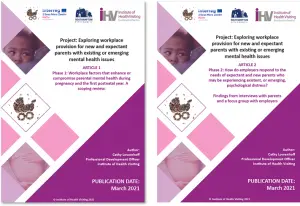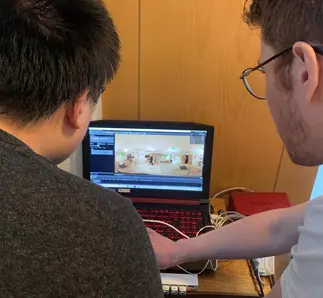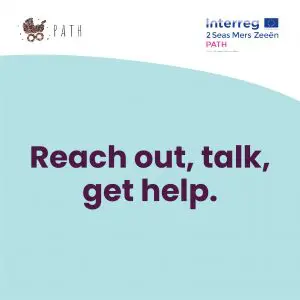
PATH, a new project to support parents experiencing perinatal mental illnesses (PMI), launches this week with a campaign to raise awareness of and de-stigmatise mental illness in the perinatal period.
Findings from a new PATH survey* echo the breadth of evidence around: concerning levels of poor mental health experienced by parents during their pregnancy or the first year after birth; their lack of confidence to seek support; and the exacerbating effects on these issues of the COVID-19 pandemic. The Institute of Health Visiting (iHV) joins the call to encourage new and expectant parents to reach out, talk and get help.
As a contributing partner in this EU-funded project, the iHV has collaborated on the 3 main aims of PATH to:
- Reach parents with digital and community initiatives for families, including a new support hub
- Reach healthcare professionals with PATH resources and training designed to increase their confidence to recognise PMI symptoms and provide appropriate care
- Reach employers with resources that help them better support maternity and paternity leave and parents’ return to work
Workplace provision for new and expectant parents with existing, or emerging, health issues
In partnership with Southampton City Council and Bournemouth University, the iHV has engaged in a project exploring workplace provision for new and expectant parents with existing, or emerging, health issues addressing:
- what employers can do to identify and support new and expectant parents who may be experiencing, or who are at risk of, mental ill-health
- what employers can do to ease the transition to parenthood and help parents achieve a satisfactory work-life balance
Findings from subsequent literature review, focus groups and interviews resulted in 10 recommendations for employers. Further detail is highlighted in the following publications:

Fathers and Partner Awareness training
There has been an overwhelmingly positive response to the new Fathers and Partner Awareness training delivered by the iHV, in partnership with Dad Matters UK, as part of the PATH project, to raise professional awareness of perinatal mental health needs of dads, co-parents and intended parents.
Feedback from SCPHN students in the 2Seas region undertaking the training include:
‘It has been great, really eye opening and has inspired me to challenge our current practices and take on this for some serious change!’
‘Thank you, it will change the way I interact with fathers, moving forward.’
‘Very helpful, food for thought on how to include all parents. to remember to include all parents when doing visits.’
‘Really opened my eyes to how excluded dads can be. In future practice I will try to engage and include them as much as possible.’
The iHV has risen to the challenge not only of the virtual world but also the world of virtual reality by participating in the development of an exciting new immersive VR resource to supplement Father Awareness training. Filming was delayed due to COVID but iHV partners, at media company Alright Mate and Bournemouth University, can be seen here putting it all together and we are looking forward to our first VR experience very soon.


( https://twitter.com/alrightmatecic/status/1391850052977668099/photo/2)
The iHV will continue to develop and review content and resources, alongside parents, peer supporters, the voluntary sector and health professionals, for the online multimedia international support hub to enable a deeper understanding of perinatal mental health issues and how to access timely and appropriate support.
About PATH
PATH is a newly EU-funded project which will enable women, families and healthcare professionals to prevent, recognise and successfully manage mild and moderate perinatal mental health issues. PATH will enable parents, the wider family, employers and healthcare professionals to find support and information to help with the parenting journey. PATH aims to promote positive parenting experiences and enable parents to feel confident in seeking self-help or professional support, leading to happier and healthier families.
PATH is partnered with organisations across the UK, Belgium, the Netherlands and France:
- Leading partner: Health and Europe Centre (UK)
- KMPT (Kent and Medway NHS and Social Partnership Trust) (UK)
- Devon Mind (UK)
- Southampton City Council (UK)
- Odisee University College (Belgium)
- Kent County Council (UK)
- Institute of Health Visitors (UK)
- World Health Organisation Centre in Lille (France)
- Artesis Plantijn University (Belgium)
- Bournemouth University (UK)
- Gio Vzw (Belgium)
- Maasstad Hospital (Netherlands)
- UZA: Antwerp University Hospital (Belgium)
References
*The research was conducted by Censuswide between 21.04.2021 – 28.04.2021, with 1,001 parents who have experienced PMI (either self-diagnosed or professionally diagnosed) during the last 10 years. The survey was conducted from a random sample of UK adults. Censuswide abide by and employ members of the Market Research Society, which is based on the ESOMAR principles.



